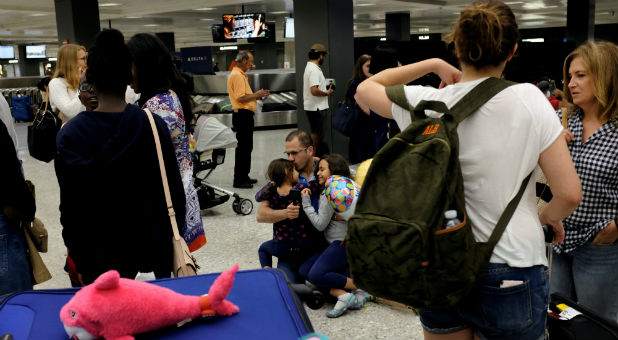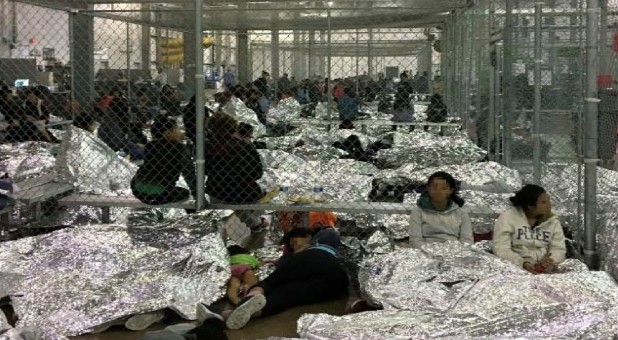U.S. President Donald Trump’s administration reversed a decision late on Thursday and said fiancés would be considered close family members and therefore allowed to travel to the United States as its revised travel ban took effect.
The U.S. State Department concluded “upon further review, fiancés would now be included as close family members,” said a State Department official who requested anonymity.
The Trump administration had previously decided, on the basis of its interpretation of a U.S. Supreme Court ruling, that grandparents, grandchildren and fiancés traveling from Iran, Libya, Somalia, Sudan, Syria and Yemen would be barred from obtaining visas while the ban was in place.
The 90-day ban took effect at 8 p.m. EDT (0000 GMT Friday), along with a 120-day ban on all refugees.
On Monday, the Supreme Court revived parts of Trump’s travel ban on people from the six Muslim-majority countries, narrowing the scope of lower court rulings that had blocked parts of a March 6 executive order and allowing his temporary ban to go into effect for people with no strong ties to the United States.
A spokesman for the Department of Homeland Security, who also requested anonymity, said it would be updating its guidance to state that fiancés would not be barred from obtaining visas while the ban was in place.
The Supreme Court exempted from the ban travelers and refugees with a “bona fide relationship” with a person or entity in the United States. As an example, the court said those with a “close familial relationship” with someone in the United States would be covered.
The state of Hawaii asked a federal judge in Honolulu on Thursday evening to determine whether the Trump administration had interpreted the court’s decision too narrowly.
Hawaii said in a court filing that the U.S. government intended to violate the Supreme Court’s instructions by improperly excluding from the United States people who actually have a close family relationship to U.S. persons, echoing criticism from immigrant and refugee groups.
Hawaii called the refusal to recognize grandparents and other relatives as an acceptable family relationship “a plain violation of the Supreme Court’s command.”
Hawaii’s Attorney General Doug Chin asked U.S. District Judge Derrick Watson in Honolulu, who blocked Trump’s travel ban in March, to issue an order “as soon as possible” clarifying how the Supreme Court’s ruling should be interpreted.
Watson ordered the Justice Department to respond to Hawaii’s request by Monday, and said he would allow Hawaii to reply by July 6.
‘Keep Fighting’
A senior U.S. official did not answer directly when asked how barring grandparents or grandchildren would make the United States safer, but instead pointed to Trump’s guidance to pause “certain travel while we review our security posture.”
The U.S. government expected “things to run smoothly” and “business as usual” at U.S. ports of entry, another senior U.S. official told reporters.
A handful of immigration lawyers gathered at Dulles International Airport outside Washington on Thursday in case of any problems.
“We’re going to keep fighting this ban, even if it applies very narrowly,” said Sirine Shebaya, a senior staff attorney at Muslim Advocates. “It’s still a Muslim ban, and it’s still trying to send a message to a whole community that they’re not welcome here.”
The administration said refugees who have agreements with resettlement agencies but not close family in the United States would not be exempted from the ban, likely sharply limiting the number of refugees allowed entry in coming months.
Hawaii said in its court filing it was “preposterous” not to consider a formal link with a resettlement agency a qualifying relationship. Refugee resettlement agencies had expected that their formal links with would-be refugees would qualify as “bona fide.”
The administration’s decision likely means that few refugees beyond a 50,000-cap set by Trump would be allowed into the country this year. A U.S. official said that, as of Wednesday evening, 49,009 refugees had been allowed into the country this fiscal year. The State Department said refugees scheduled to arrive through July 6 could still enter.
Trump first announced a temporary travel ban on Jan. 27, calling it a counterterrorism measure to allow time to develop better security vetting. The order caused chaos at airports, as officials scrambled to enforce it before it was blocked by courts. Opponents argued that the measure discriminated against Muslims and that there was no security rationale for it.
A revised version of the ban was also halted by courts.
The State Department guidance, distributed to all U.S. diplomatic posts on Wednesday evening and seen by Reuters, fleshed out the Supreme Court’s ruling about people who have a “bona fide” relationship with an individual or entity in the United States.
It defined a close familial relationship as being a parent, spouse, child, adult son or daughter, son-in-law, daughter-in-law or sibling, including step-siblings and other step-family relations.
A department cable said grandparents, grandchildren, aunts, uncles, nieces, nephews, cousins, brothers-in-law and sisters-in-law, fiancés, “and any other ‘extended’ family members” were not considered close family.
The guidelines also said workers with offers of employment from a company in the United States or a lecturer addressing U.S. audiences would be exempt from the ban, but that arrangements such as a hotel reservation would not be considered bona fide relationships. {eoa}
© 2017 Thomson Reuters. All rights reserved.
See an error in this article?
To contact us or to submit an article






















